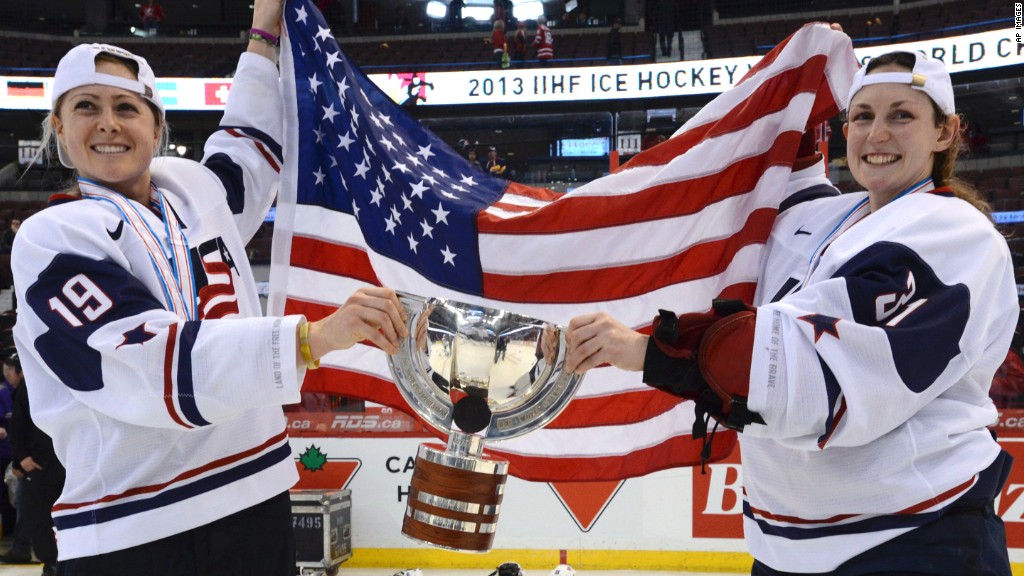
The U.S. Women's National Hockey Team and USA Hockey are locked in sensitive negotiations over pay and benefits, and the clock is ticking.
The International Ice Hockey Federation World Championship games begin on March 31. The women say they will sit out the tournament unless progress is made. USA Hockey has said that if it comes to it, it will put a team on the ice without the protesting players.
The two sides seemed to be nearing an agreement, according to the women. However, on Thursday they were informed that USA Hockey was contacting alternate players -- a bad sign for the negotiations.
The women say they want to be paid $68,000 a year, which is far more than they currently get from USA Hockey.
But the players say their case is about more than money. They want better job benefits for IIHF games -- equal to those given to their male counterparts.
Related: Pay fight between USA Hockey and women's players intensifies
The women want to be able to bring guests to competitions, fly in business class and get disability insurance.
USA Hockey said in a statement on Friday that those things cost too much.
"The players' demands would result in total player compensation in an Olympic year of approximately $210,000 per player if the team attains a silver medal and $237,000 for a gold medal," the statement said.
That total includes "travel for a guest to every event and exhibition game."
USA Hockey said offering the women players "business class airfare on flights of more than three hours" would contribute to expenses of "more than $1.3 million."
USA Hockey declined repeated requests for comment for this article.
But USA Hockey player handbooks for the 2013 and 2014 IIHF competitions, obtained by CNNMoney, detail some of the perks the men's team received.
Related: USA Hockey will compete in women's world games -- with or without protesting players
Based on the player handbooks, the men were allowed to bring along a guest while competing in the world championship games. USA Hockey paid for their guests' transportation costs, and the guests were permitted to stay in the player's hotel room.
The guests were allowed to stay until the end of the championships and also received breakfast, game tickets and an apparel package.
Not only were the women not permitted a guest, they were forced to share a room with a teammate.
The men traveled to the IIHF games in business class while the women traveled in coach. On the return trip, the men could choose to travel with their guests in economy.
Another key difference?
USA Hockey paid for the disability insurance of players on the men's team but not for players on the women's team, according to the handbooks.
The discrepancies between the benefits that the men and women got were confirmed by current members of the women's national team who played in 2013, as well as an industry agent, Brant Feldman.
Related: Andy Murray: Equal pay at tennis majors something to be proud of
The protest by the women's team comes after months of failed negotiations between the two sides.
Last week, USA Hockey gave the women a deadline to commit to playing in the IIHF games. If they didn't, USA Hockey said it would field a team to compete in the world games -- with or without the current members.
But on Monday, players from the women's team met with USA Hockey to try to come to terms and avoid sitting out the games. One of the women told CNNMoney that she and her teammates are hopeful they'll reach a resolution with USA Hockey and report to camp on time.
In addition to a salary and the other benefits, the women want child care, maternity leave and the ability to compete in more games throughout the year.
In the past, USA Hockey has said that it's a governing body and not an employer, and so it has no plans to classify the women as full-time employees.
Related: This could close the gender pay gap in 27 years
The women's hockey fight for fair pay is just the latest in a series of public battles for gender parity in sports.
Players on the U.S. Women's National Soccer team have also been vocal about the fact that they're paid less than the men and get less money for daily expenses while traveling. In 2016, they filed a complaint with the Equal Employment Opportunity Commission and are still awaiting a decision.
One sport where women have made progress in pay and treatment is tennis. It didn't come without a fight, but now major tournaments offer the same purse for men and women.

